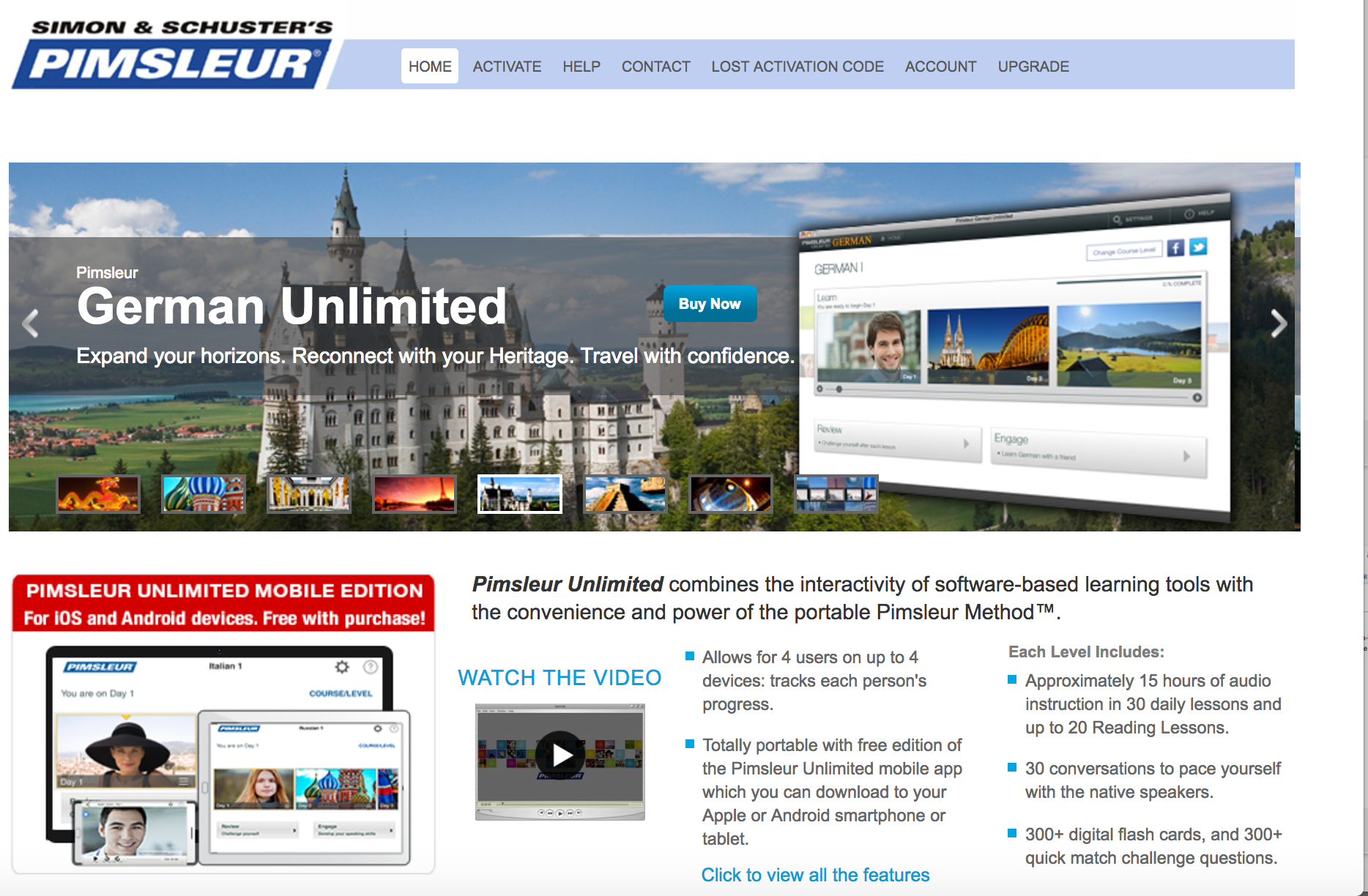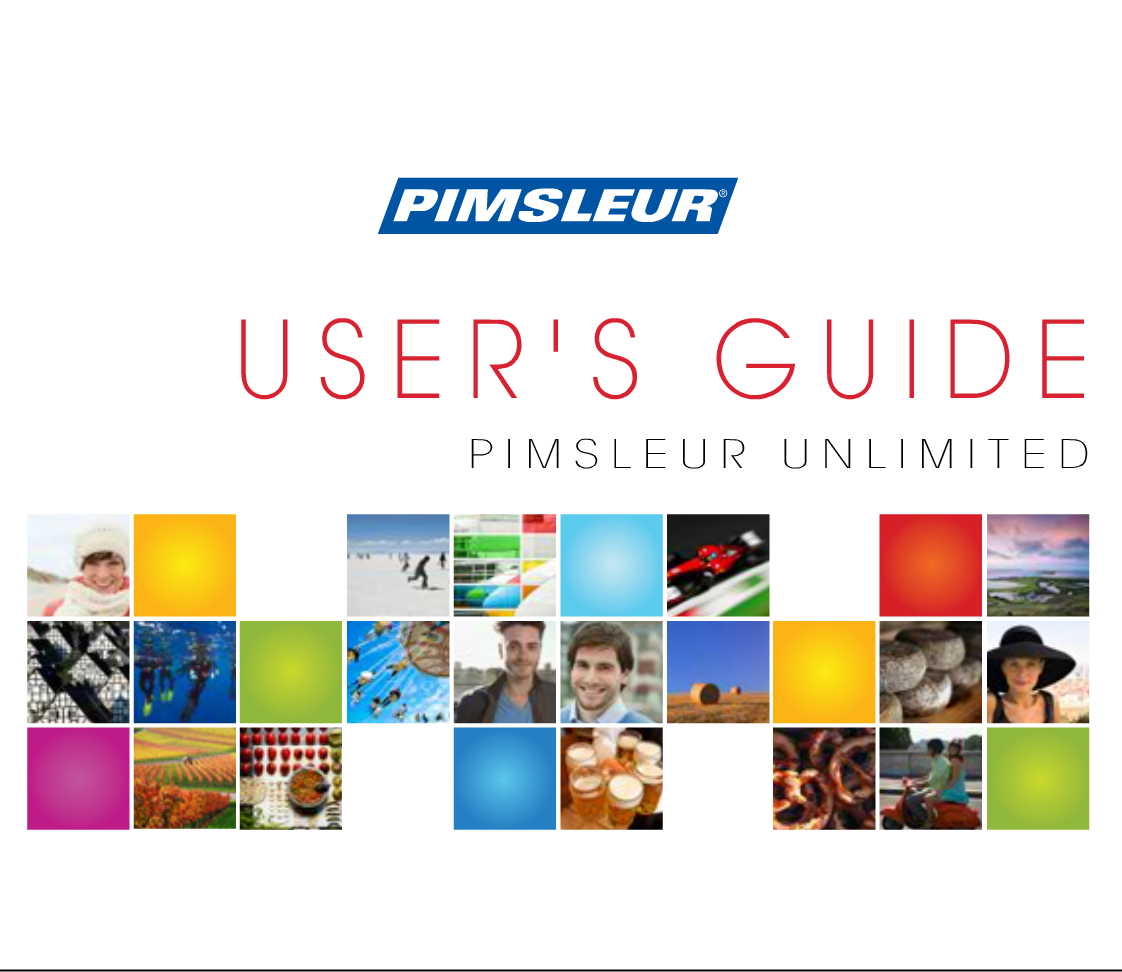Language Learning: From Pimsleur Audio to Unlimited
 Language Learning with Pimsleur Unlimited
Language Learning with Pimsleur Unlimited
Paul Pimsleur developed his language learning method over 50 years ago. And, if you read on, you'll understand why taking a look at Pimsleur Unlimited is feeling a little bit like "back to the future" for me.
If you've ever used Pimsleur audio lessons for learning a language, you'll know how deeply the sound of words and phrases embed themselves in your brain with this program.
Young children also learn their first language through sound. They hear (and repeat) their caregivers' words, phrases, and sentences numerous times, begin to absorb the patterns of the language, and put all of this together to say what they want, and to understand others.
The Adult's Conundrum with Language Learning
When you learn a new language as an adult, you're in fact learning a new sound system, which runs parallel to the one of your native language (or to a second, or third, etc., if you speak more languages).
A problem for adults is that they may find it difficult to hear some of the sounds in a new target language. Why is that so?
Very early on, children's brains make it possible for them to hear ANY  sounds of ANY language. As they focus on learning their first language, this ability narrows down to the sounds they listen to and use in their daily life.
sounds of ANY language. As they focus on learning their first language, this ability narrows down to the sounds they listen to and use in their daily life.
This narrowing down of sounds heard continues through adolescence and adulthood and can be traced to the growth of our “categorical perception.” (We described this phenomenon in an earlier post: “Beyond Learning a Language Like a Child”.)
So, adults have to re-learn how to hear and produce sounds that are not part of the language(s), they use in their daily life. It can be done, but they have to focus and practice.
Before you read on, you may want to read my disclosure at the bottom. For these reasons I can't really provide an objective review of the German course(s). But by starting to use the Pimsleur Unlimited Russian app, I'm able to judge how the app works for a language that I don't know. (And I will report about my language learning experience with Russian in a subsequent post.)
What I know well: Pimsleur German Audio CDs
Obviously, I'm well familiar with the features that make a Pimsleur German audio effective:
- Each unit's initial conversation has only one new word or phrase.
- Later in each unit, new words are introduced in the context of what you know.
- You hear and repeat new words, with backward buildup. (Singers call it "back-chaining.")
- Comments on pronunciation issues are given as they come up.
- A “spaced” recall schedule helps you move words from short to long-term memory.
- You learn to make new combinations following a familiar pattern.
- The speakers pronounce clearly, with a standard German accent.
- You learn the sound system of German.
- You learn basic German sound-spelling correlation in the Reading sections.
- The units are downloadable. You can play them on your computer or mobile device.
But, no course can be everything to everyone. People have asked about these points:
- There's no systematic introduction to grammar. There are only brief explanations.
- Not enough vocabulary. Each unit introduces about 10 new words.
- Most cues are in English, so you hear a lot of English.
- You don't learn the spelling of the German words and phrases you hear.
Pimsleur audio does a very good job teaching the sounds and pronunciation to adult beginners. And most importantly, it asks the learner to SPEAK, REPEAT, and IMITATE. Good pronunciation can become a habit. Pimsleur gets you into the good pronunciation habit.
User comments, competition, online/app progress, etc. were certainly reasons for expanding the Pimsleur method, first to downloadable software, and now also to mobile apps.
What I'm discovering: Pimsleur Unlimited
 To try out Pimsleur's "Unlimited" mobile app, I used the iOS app for German. To its traditional audio course, Pimsleur has added Flashcards, Quick Match, and Speak Easy exercises. (To date, Pimsleur has 8 languages in its Unlimited mobile edition: German, French, Italian, Spanish, Brazilian Portuguese, Chinese Mandarin, Japanese, and Russian.)
To try out Pimsleur's "Unlimited" mobile app, I used the iOS app for German. To its traditional audio course, Pimsleur has added Flashcards, Quick Match, and Speak Easy exercises. (To date, Pimsleur has 8 languages in its Unlimited mobile edition: German, French, Italian, Spanish, Brazilian Portuguese, Chinese Mandarin, Japanese, and Russian.)
The core of the program is still the audio lesson, as described above. The added feature for "Unlimited" is that you can easily pause, skip back and skip forward when doing the audio. You can keep redoing a short (or longer) segment until you've got it.
With the Flashcards, Quick Match, and Speak Easy exercises you have new and different tools for quick language learning practice and recall of what you've learned.
Listening + Reading
Besides, you're learning to hear and understand, to say, and to READ words, phrases, and sentences in context. By learning to read beyond basic sound-spelling correlation, you're acquiring a powerful language learning tool.
Yes, children learn languages without first learning to read. By age three to three and a half, many children are highly conversant in their native language. However, they then spend years in school to learn to read and write fluently.
For adults, reading and writing in one's native language is part of daily life. When you learn new words in a foreign language, you automatically imagine how they are spelled. Without other information, you'll apply your own native-language, or other familiar spelling system.
By learning how German words sound and are written, you're training yourself to become a reader of German texts.
German is plentiful on the Internet in the form of news stories, social media streams on Twitter, Facebook, and Instagram (to name the most popular), ebook readers you can download, etc. Once you make a habit of reading German on a daily basis, your vocabulary will grow exponentially.
My Tricks With Russian
I'm a native speaker of German and taught college German for a number of years in the U.S. Right now I'm learning Russian from scratch with Pimsleur Unlimited. In general, my tricks for using the program with Russian are also applicable for German, or any other language. (I'm planning a more detailed review of Pimleur's Unlimited Russian for later.)
Whenever I start with a new online program or app, it takes me a couple of weeks to get into it and figure out ways I can optimize the resource.
The Pimsleur Unlimited mobile app is very easy to navigate, so you can hop around. Besides learning daily with new material, I go back and review. I love it that you can pick and choose what chunks to redo.
I go back a lot and replay parts of the course. For example, I replay the five last conversations, one after the other, just the conversations. Or I listen to one conversation again and again, until I've memorized it.
I replay an earlier Quick Match or Speak Easy, or several of them in a row.
A small notebook for each language is a constant companion for me.  In it, I write down words and phrases, as well as brief grammar explanations that come up.
In it, I write down words and phrases, as well as brief grammar explanations that come up.
Even if I never check back to those particular notes, just the act of writing something out by hand, helps me to remember better. Writing out also makes me literate right from the beginning and teaches me the new spelling system as I go along.
From time to time during the day, I recall in my mind - without the app - the words or phrases I learned the day before. There always are a few moments of down time to do this. My little notebook helps me if I need a prompt.
I certainly follow Paul Pimsleur's Golden Rule for Success #4: "Daily exposure to the language is critical to your success, but don’t attempt to do more than one 30-minute Audio Lesson per day. You may repeat a lesson more than once if you find it helpful." (You'll find these rules in the downloadable PDF of Pimsleur Unlimited User Guide, see screenshot above.)
How Fast Can You Learn German (or Russian)?
Learning a language takes time and effort. (Whew, how many times have I said this in my life?) Becoming fluent in a new language as an adult cannot happen just like that in 10 days. Three months of total immersion, with an excellent tutor on the side, may do it. At least that was my experience when I learned Dutch, and later English.
Learning a language as an adult with a job, a family, and a social life means you have to squeeze language learning in whenever you can. And you have to keep your motivation up.
With Pimsleur you can get a good start and keep going. Most of all, you'll build some confidence in speaking. For many, having the courage to speak in a new language is the hardest part.
As you need them, add other resources, such as a basic grammar book (to figure out what some of the underlying patterns are), podcasts or audio books (to learn listening to rapid German), a browser extension, such as Lingua.ly (to help you read many different types of texts), or a flashcard program, such as Memrise (to practice various types of vocabulary).
Finding a language exchange partner, or a tutor via Skype can also be a powerful motivator. If you can, travel to a country or region where the language is spoken.
Putting in the effort is really worth it. Most of all, have fun! Viel Spaß!
Let us know your comments below.
Bio: Ulrike Rettig is the co-founder of GamesforLanguage.com. She is a lifelong language learner, growing up in Austria, the Netherlands, and Canada. You can follow her on Facebook, Twitter and Instagram, and leave any comments with contact or below.
Disclosure: Ulrike Rettig was the Development Editor/Author of Pimsleur's German Levels 1, 2 and 3, written during the time she worked for Pimsleur Language Programs (owned since 1997 by Simon & Schuster Audio). She left Pimsleur in 2010. GamesforLanguage has no business relationship with Simon & Schuster, other than receiving the German and Russian Unlimited apps for free.
